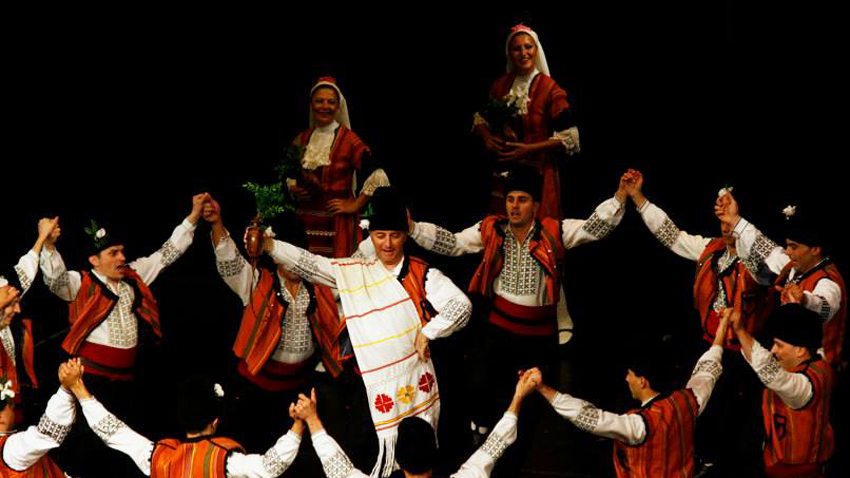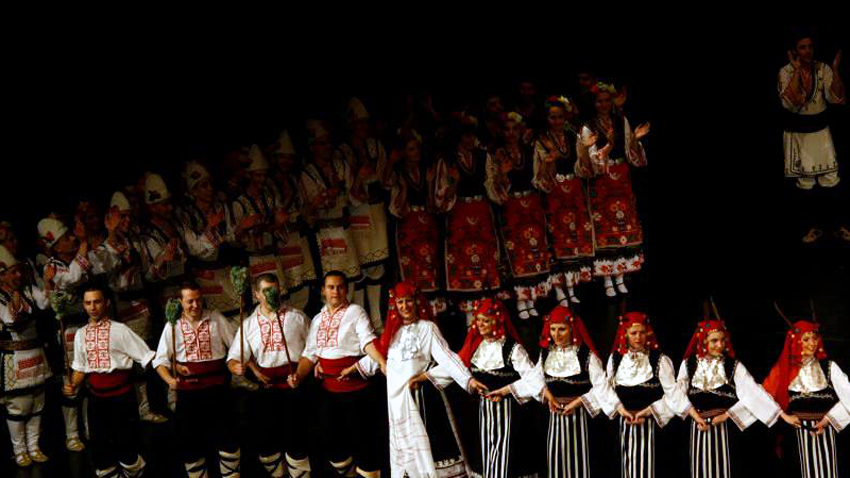It doesn’t take much for a person to start performing Bulgarian folk dances - it all starts with desire and love of folklore. And once you start dancing, part of you will always remain in the dance because it is a magic that gives strength, positivity, and beauty. Moreover it gives birth to good friendships between people.
The dancers from Balkan Folk Dance Ensemble are some of the people in love with Bulgarian folklore. They are frequent guests at various venues in this country and abroad. From 8 to 15 August, they represent Bulgaria at the 44th edition of the Terranostra International Folklore Festival /Festival Internazionale del Folclore Terranostra/ held in Apiro, Italy. Along with representatives of the hosts participating in the event are groups from Peru, Taiwan, Guatemala, Russia and Serbia. Dance, music, a colourful palette of nationalities - this makes each festival a memorable experience for the participants and spectators. Besides the memories remain also the contacts with colleagues and associates.

Milena Chirpanlieva from Balkan ensemble tells RB more: "Several years ago, more precisely at a festival in 2002, we became friends with the Bulgarian dance ensemble in Budapest called Martenitsa. And since then we have been working together, visiting and helping each other. We have good friends in Turkey and Italy, as well. The festival where we are now is also a result of an encounter at a similar forum in France. These events very quickly created some wonderful relationships between people. The festival is a unique place which brings together smiling and cheerful people. The beautiful emotions from it subsequently continue in meetings off stage."
The foundations of Balkan folk ensemble were laid back in 1954. Years passed by and today no one can count the concerts given by the dancers. They admit that they remain with their constant desire to absorb the intricacies of this art, to be among the best and have their own style.
"This year the group turns 60. On this occasion we did a big concert in Sofia”, continues Milena Chirpanlieva. “We rehearse at the "Tsar Boris III-1928" National Cultural Centre in the capital. We have children's groups to prepare kids to join the ensemble, as well as groups for authentic dances. Our main work is with the representative ensemble. There are dancers from 13 to 50 years of age, with different professions and occupations. All are united by the love of Bulgarian folklore and it is an extreme pleasure for us to promote it in Bulgaria and abroad. Head of Balkan ensemble since 1974, with little interruption, has been choreographer Kiril Chirpanliev. We perform dances from all ethnographic regions of Bulgaria. We are best at the Shoppe and Thracian dances but try to learn others, as well. Most of them are choreographed by Kiril Chirpanliev. What is specific to us is that we recreate Bulgarian rituals on stage via dancing. Everywhere we go people want to know more about their content - so the audience becomes introduced to Bulgarian folklore, customs and history.”

English Rossitsa Petcova
Photos: courtesy to the Balkan EnsembleThe first EU Songbook has been released, featuring six songs from each of the 27 EU member countries and Ode to Joy, the anthem of the European Union, reports BTA. The Songbook, a non-profit Danish initiative, has no financial ties to the EU,..
Days of Bulgarian culture will be organized in Madrid between November 9 and December 31, 2024, BTA reported, citing Latinka Hinkova, president of the Association of Bulgarians and Artists "TREBOL" and head of two Bulgarian Sunday schools in Torrejon de..
The national awakeners of Bulgaria are the individuals for whom we feel not only gratitude and admiration, but also perceive as some of the most significant figures in our history, because they awaken our sense of national togetherness. However, what is..
“A story that is worthy of a movie” is what we often say when we hear about some incredible event or an interesting story. It is cinema..
The fourth national Biennial of Illustrations opens today in the triangular tower of Serdica, part of the Regional Museum of History in Sofia. As..

+359 2 9336 661
